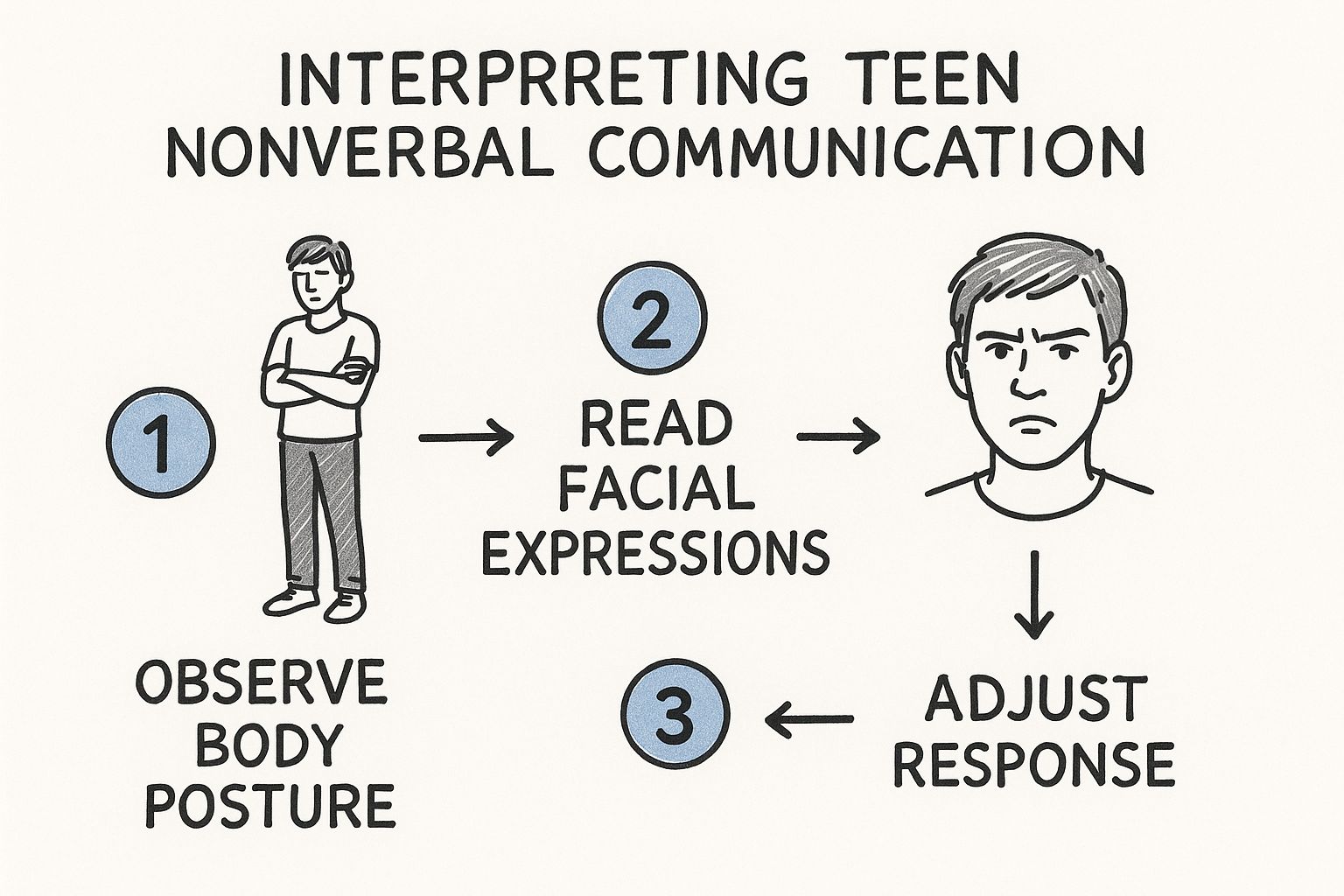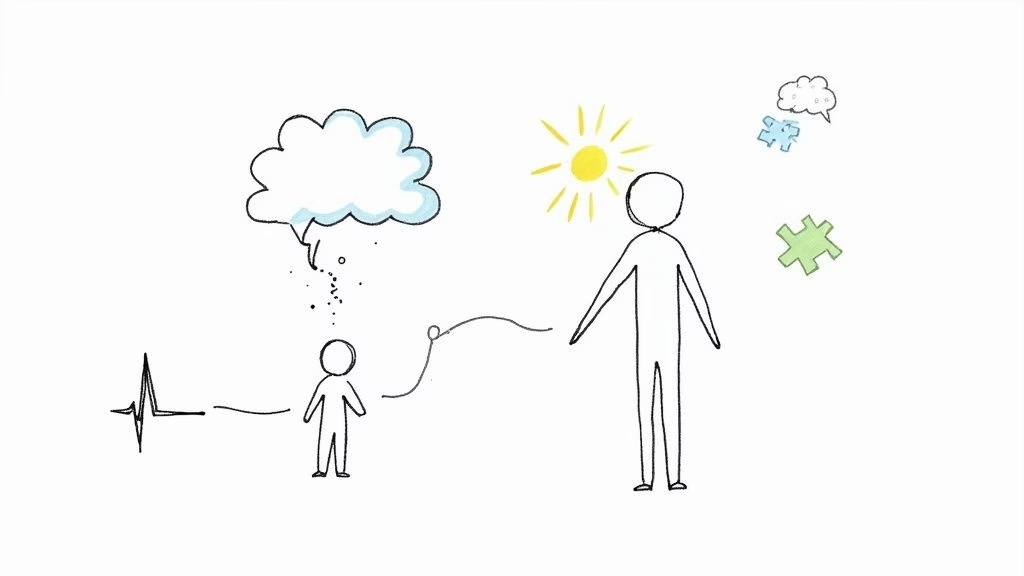Being a teenager is tough. Let's not pretend it isn't. You're juggling school, trying to figure out friendships, and thinking about what comes next—it's a lot. And when you feel stuck, it’s easy to procrastinate or lose motivation. I've been there.
This is where learning to communicate well becomes your secret weapon. It’s not just about talking; it’s about learning to handle group projects without pulling your hair out, navigating awkward social moments, and quieting that anxiety, one conversation at a time. It's a real-world skill that genuinely makes life easier.
Why Strong Communication Is a Teen Superpower
Think of communication as a toolkit for building better connections and getting what you want out of life. It’s how you get your ideas across clearly, really listen to what someone else is saying, and even pick up on the things people aren't saying with their body language.

These skills are huge, not just for your personal life but for your future. I've seen it time and time again: the students who stand out in college applications and later in their careers are the ones who can communicate with confidence. They know how to make a good impression and show they have leadership potential. Curious about the specifics? You can learn more about how communication sets teens up for success.
Before we dive into the how-to, let's break down the core areas we'll be focusing on. These four pillars are the foundation for becoming a more confident and effective communicator.
The Four Pillars of Teen Communication
Here’s a quick look at the core communication areas this guide covers and why each one is a game-changer for teen success.
| Communication Type | Why It Matters for Teens |
|---|---|
| Verbal Communication | Helps you ace presentations, contribute in class, and have more meaningful conversations with friends and family. |
| Non-Verbal Cues | Your body language often says more than your words. Mastering it builds confidence and helps you read social situations. |
| Active Listening | Makes people feel heard and respected, which is the fastest way to build strong, genuine friendships. |
| Written Skills | Crucial for everything from texting friends clearly to writing emails to teachers and crafting killer college essays. |
Mastering these skills isn't about becoming someone you're not. It's about giving you the tools to express who you are more effectively.
Finding Your Voice and Building Resilience
Sometimes, it feels hard to open up, especially when you're struggling. It's easy to feel like you have to have it all figured out on your own. But finding healthy ways to express yourself is essential. It's what keeps stress from building up into something bigger.
This is where your communication skills tie directly into your mental health. Learning how to talk about what you're feeling in a constructive way is a huge relief. It prevents things from spiraling into anxiety or frustration. Practices like guided meditation can also be a game-changer—giving you a way to calm your mind, manage stress, and figure out your thoughts before you even say a word.
"The ability to communicate effectively is not just a skill; it's a cornerstone of mental wellness. It empowers teens to advocate for their needs, build authentic relationships, and navigate challenges with confidence and resilience."
Ultimately, putting effort into these skills is one of the best investments you can make in yourself. It's the foundation for better friendships, less stress at school, and a healthier mindset for whatever comes next.
Building Confidence in a Face-to-Face World
It’s no secret that most of our lives happen on screens now. Because of that, face-to-face conversations can sometimes feel awkward, maybe even a little overwhelming. In fact, real-world social interaction among teens has actually dropped by over 45% in the last two decades, and it's pretty clear this trend is linked to how much we're all on our phones.
This shift makes building in-person confidence a more important skill than ever. The goal isn't about being perfect—it's about feeling more prepared and less anxious in any social situation, whether that’s a class presentation or an interview for a part-time job.
Practical Steps for Real-World Confidence
So, how do you start? The best way to get better at anything is to practice, and communication is no different. The key is to start with small, manageable actions in a low-pressure setting, like with your family or close friends.
A great place to begin is with the ‘Five-Minute Conversation Challenge.’ The rules are super simple: grab a family member, put your phones away, and just talk for five minutes. It doesn't matter what you talk about. The point is to practice listening and responding thoughtfully without any digital distractions.

This simple infographic is a fantastic guide for reading non-verbal cues, which is a huge part of face-to-face interaction. When you start paying attention to things like posture and facial expressions, you get a much better sense of the unspoken parts of a conversation. It's how you really connect.
Mastering Your Body Language
Believe it or not, your body language often speaks louder than your words. When you use open, confident gestures, it can completely change how others see you. More importantly, it changes how you feel about yourself.
Here are a few things you can start practicing right away:
- Maintain Comfortable Eye Contact: This doesn't mean you have to stare someone down. Just try holding eye contact for 4-5 seconds at a time, then briefly look away before re-engaging. It's a simple way to show you're listening without making things feel intense.
- Use Open Gestures: Try to avoid crossing your arms or hunching over your shoulders. Those postures can send a signal that you're closed off or nervous. Instead, keep your posture upright and your hands visible. It makes you seem much more approachable and confident.
- Practice Your Handshake: A firm, brief handshake is a classic sign of confidence. It’s especially useful in more formal settings, like an interview or when you’re meeting a new teacher.
Building this kind of self-assurance takes time and practice. It’s about learning to be comfortable in your own skin and trusting your ability to connect with others authentically.
For parents reading this, creating a supportive environment is everything. Simple changes, like starting a tradition of 'device-free dinners,' can open the door for more natural conversation. The goal is to make talking together a normal, enjoyable part of the day, not a chore.
These small habits build a strong foundation for a teen's social confidence. It all adds up to a powerful toolkit for navigating any social situation with a little more ease. If you're looking for more strategies, our guide on how to build confidence offers even more actionable steps.
The Art of Listening and Showing Empathy
Great communication isn’t always about what you say. More often, it’s about how well you listen. Real connection happens when the other person feels genuinely heard and understood. This is where active listening and empathy come in—they're the tools that help you build trust and create stronger, more meaningful friendships.

This goes way beyond just staying quiet while someone else talks. It’s about really engaging with what they're saying and, just as importantly, what they're feeling. A few simple techniques can completely change the vibe of a conversation.
Simple Techniques for Powerful Listening
Try these out the next time you're talking with a friend or family member:
- Paraphrasing: After they share something, try repeating it back in your own words. Something as simple as, "So, it sounds like you're feeling really overwhelmed with schoolwork right now," shows you're actually paying attention. It also gives them a chance to correct you if you misunderstood.
- Asking Open-Ended Questions: Ditch the questions that get a simple "yes" or "no." Instead of asking, "Was school okay?" try something like, "What was the most interesting part of your day?" Questions like that invite a real story, not just a one-word answer.
These small shifts can turn a monologue into a genuine dialogue. When you focus on understanding the other person first, you create a space where they feel safe enough to be vulnerable. This is a game-changer when a friend is stressed out or you're trying to work through a disagreement with a parent. Just hearing their side first can cool things down instantly.
Empathy is the ability to understand and share the feelings of another. It doesn't mean you have to agree with them, but it does mean you're willing to see the world from their perspective.
Connecting Empathy to Mental Wellness
Learning to be empathetic isn't just about being a good friend—it's a huge boost for your own mental health. When you make an effort to understand where others are coming from, it chips away at feelings of isolation for everyone involved. Study after study shows that strong social connections are one of the biggest factors in managing stress and building emotional resilience.
For teen boys, who often feel pressured by society to bottle up their feelings, finding a safe place to practice this is key. Things like local men's groups or mentorship programs can be great environments where open communication is the norm. Building these skills helps you not only support your friends but also get better at understanding and speaking up for your own needs.
If you really want to get good at this, learning how to deeply analyze interview data can sharpen your listening skills in a big way. The same principles of deep, empathetic listening used in professional analysis apply directly to your everyday conversations.
Ultimately, practicing empathy and active listening is a form of self-care. It strengthens your relationships, boosts your emotional intelligence, and gives you the tools to handle life's challenges with more confidence and connection. You can find more strategies in our guide to teen communication skills.
Using Your Voice for School Success
Strong communication skills aren't just for making friends—they’re a game-changer when it comes to school. When you’re feeling overwhelmed, procrastination starts to creep in, and motivation tanks, the way you communicate can be your most powerful tool for getting back on track. It’s the difference between feeling stuck and taking control of your own education.
I see it all the time. A lot of students avoid talking to their teachers because they’re nervous or just don’t know what to say. But learning to advocate for yourself is a skill that melts away that anxiety and builds the confidence you need to tackle any academic challenge. It all starts with knowing how to ask for what you need, clearly and respectfully.
How to Talk to Teachers Effectively
Let's say you're falling behind in a class or a specific topic just isn't clicking. Instead of letting the stress pile up, try a direct approach. From my experience, most teachers really appreciate it when a student takes the initiative to ask for help. You can catch them after class or shoot them a professional email.
Here are a few simple scripts you can adapt to get the ball rolling:
- When you need an extension: "Hi [Teacher's Name], I'm struggling to get this assignment done by tomorrow. Could I possibly get a one-day extension to make sure I can do my best work on it?"
- When you need extra help: "I'm having a hard time understanding [specific topic]. Are there any other resources you'd recommend, or could we find a few minutes to talk before or after school?"
- When you want to discuss a grade: "I was hoping to better understand my grade on the recent test. Could you help me see where I went wrong so I can improve for the next one?"
Talking things out is huge, but don't forget that building effective written communication skills is just as critical for school and whatever comes next. A well-written email shows maturity and a respect for your teacher’s time.
Navigating Group Projects and Peer Conflict
Ah, group projects. They can be a massive source of stress, especially when it feels like not everyone is pulling their weight. The best way to dodge future issues is with clear communication right from the start. Before you even begin, get together and assign specific roles and set firm deadlines for each part of the project.
If a conflict still pops up, address it directly but calmly. The key is to avoid blame and instead use "I" statements to explain how the situation is affecting you.
Instead of saying: "You never do any of the work, and it's not fair."
Try this: "I'm feeling stressed about our deadline and I'm worried we won't finish in time. Can we talk about how to split up the rest of the work more evenly?"
This approach keeps the focus on the problem, not the person, which opens the door for a real solution. Trust me, it’s a communication skill that will serve you well way beyond the classroom.
Finding Your Voice: A Guide for Young Men
Let's be real—it’s not always easy for guys to talk about what’s actually going on. Society can send a pretty strong message that you should just keep things to yourself, but I've learned that expressing your thoughts and feelings is a sign of strength, not weakness. This section is all about navigating those unique challenges and finding resources that actually help.

Sometimes, the biggest hurdle is just getting started. It can feel a lot like procrastination or a lack of motivation, but often, it's just about finding the right tools and the right people to connect with. If you're struggling with that first step, our guide on how to find motivation can give you some practical ways to get moving.
Finding Your Tribe: Men's Groups and Mentorship
You don't have to figure everything out on your own. Seriously. Connecting with other guys who just get it can make a massive difference. This is where mentorship programs and men's groups come in.
Organizations like The ManKind Project and many local community centers offer safe, structured environments for young men. These groups give you a space to build supportive networks, practice talking openly, and learn from older mentors without any judgment. It’s a place to talk about school, stress, and future goals with people who have been there before.
A Simple Meditation Guide to Center Your Thoughts
Before you can communicate your thoughts clearly, you have to know what they are. Mindfulness is an incredible tool for cutting through the noise and gaining that clarity. If your mind feels chaotic, try this simple guided meditation.
- Find a Quiet Spot: Sit comfortably in a chair, feet flat on the floor, hands resting in your lap.
- Close Your Eyes: Take a slow, deep breath in through your nose, and let it out just as slowly through your mouth.
- Focus on Your Breath: Keep breathing deeply. Notice the feeling of the air moving in and out of your body. Don’t try to change it, just observe.
- Acknowledge Your Thoughts: When a thought pops into your head—and it will—just notice it without judging it, then gently bring your focus back to your breath.
- Stay for Five Minutes: Start with just five minutes. This simple practice helps calm your nervous system and organize your thoughts, especially before a tough conversation.
This is a total game-changer for managing school stress and anxiety.
Critical Resources for Mental Health Support
Learning to communicate well is deeply tied to your mental health. Globally, about one in seven adolescents deals with a mental health condition. Recognizing when you need support and knowing where to find it is a communication skill in itself. This research from the World Health Organization highlights the global challenge of teen mental wellness.
Asking for help is one of the bravest things you can do. It’s a sign that you value yourself and are ready to take control of your well-being.
If you or a friend is struggling, these resources are available 24/7. They're confidential and specifically designed to help young men and all teens navigate tough times.
- 988 Suicide & Crisis Lifeline: You can call or text 988 anytime for immediate, free, and confidential support.
- The Trevor Project: This organization offers crisis support specifically for LGBTQ young people at 1-866-488-7386.
- Boys Town National Hotline: This resource at 1-800-448-3000 provides support and counseling for teen boys and their families.
- Online Counseling Services: Platforms like BetterHelp and Talkspace offer therapy designed for teens, connecting you with licensed professionals from the privacy of your own home.
Your Questions on Teen Communication Answered
Talking with teens—or as a teen—can feel like navigating a minefield sometimes. It's a common struggle for parents and teens alike. Below are some of the questions I hear most often, with real-world answers to help close the distance and build stronger connections.
How Can Parents Get Their Teen to Open Up?
This is the big one I hear from parents. You want to connect, but pushing a shy or introverted teen to talk can make them pull back even more. My advice? Start small and keep the pressure low.
Create opportunities for casual, one-on-one chats about things they actually care about. Maybe it's a new video game, an artist they're obsessed with, or a book they just finished. Car rides and mealtimes are goldmines for these kinds of conversations. The goal is to make talking feel like a normal part of life, not an interrogation.
Another thing that works wonders is role-playing. Seriously. If your teen is stressing about asking a teacher for help or dealing with a tricky situation with a friend, practicing the conversation at home can take the edge off. It makes the real thing feel way less intimidating.
Don't forget to celebrate the small wins. When they start a conversation or share an opinion, acknowledge it. It's not about demanding a perfect heart-to-heart; it’s about appreciating the effort. That's how confidence is built.
How Do We Handle Disagreements Better? (And What About School?)
For teens, learning to disagree without it turning into a full-blown fight is a game-changer for life. Whether it’s with a parent or a friend, the key is learning to express yourself without putting the other person on the defensive.
The most powerful tool here is using "I" statements. Instead of saying, "You never listen to me," which sounds like an attack, try framing it from your perspective: "I feel frustrated when I can't explain my side of the story." This shifts the focus from blame to your own feelings, which is so much easier for someone else to hear.
This skill is crucial for school, too, especially when motivation drops and procrastination kicks in. It's no secret that being a teen is stressful. A study by the American Psychological Association found the average teen stress level is 5.8 on a 10-point scale—that’s higher than what’s considered healthy for adults. Learning to communicate what you need is one of the best ways to manage that pressure.
Here's how you can start taking charge:
- Ask for a timeout. If things get heated, it's okay to say, "Can we talk about this later when we're both calm?" Find a time to come back to it when emotions aren't running high.
- Listen to actually understand. Don't just wait for your turn to talk. Try to genuinely hear where they're coming from. Repeating back what you heard ("So, you're worried about my grades dropping?") shows you're actually listening.
- Look for a compromise. The point isn't to "win." It's to find a solution you can both live with. That shows maturity and proves you're committed to working things out together.
What About Resources for Teen Boys and Mental Health?
For a lot of guys, there’s this unspoken pressure to have it all figured out, which can make it tough to talk about what’s really going on inside. Finding the right spaces and people to talk to is essential for mental well-being.
Many communities have men's groups or mentorship programs that are designed to be safe, no-judgment zones. They're great places for young men to connect with peers and positive role models, and just practice being open.
Mindfulness is another huge one. It doesn't have to be complicated. A simple five-minute meditation guide can help you quiet the noise in your head and get your thoughts straight before a tough conversation. It's amazing how much a few deep breaths can do for anxiety and clarity.
And if you or a friend are really struggling, please know that asking for help is a sign of strength, not weakness. Help is always available, and it's confidential.
- 988 Suicide & Crisis Lifeline: You can call or text 988 anytime for immediate support.
- The Trevor Project: They provide crisis support specifically for LGBTQ youth at 1-866-488-7386.
- Boys Town National Hotline: This resource at 1-800-448-3000 is specifically for teen boys and their families.
At Andrew Petrillo Life Coaching, I help teens build these exact skills—managing stress, finding motivation, and tackling challenges with confidence. If you're ready to start building a new toolkit for life, learn more about my personalized coaching at https://andrewpetrillolifecoaching.com.



















